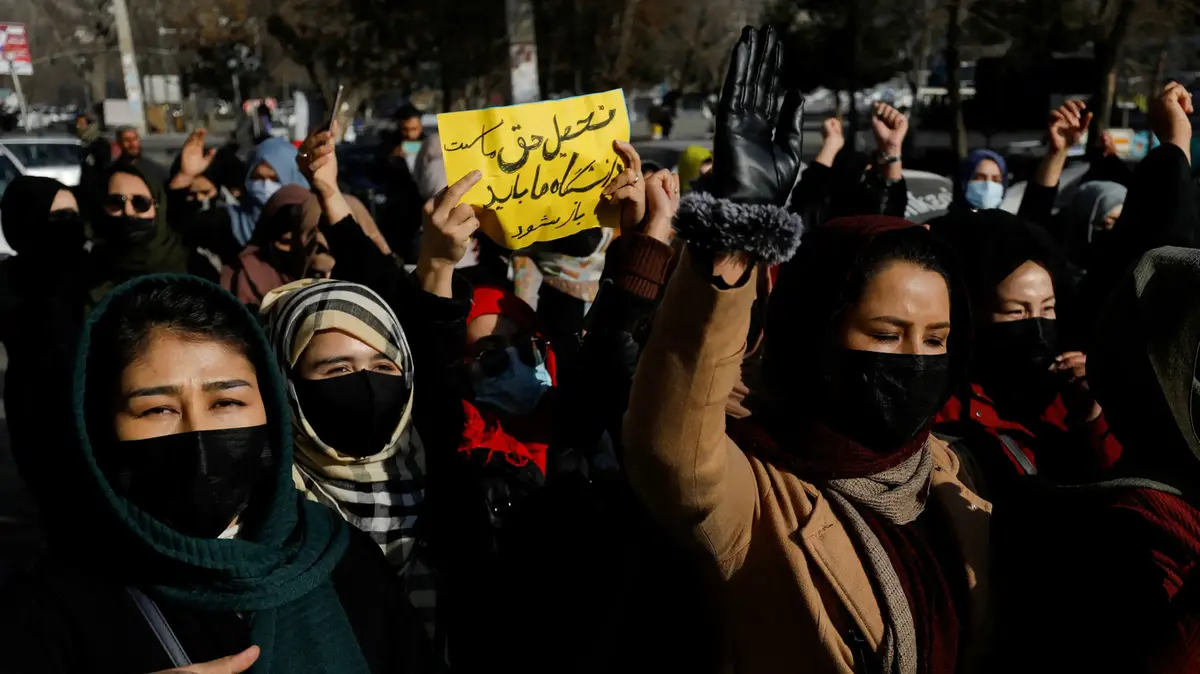Demonstration of women in Kabul against the Taliban's decision to prevent them from studying at the academy (Reuters)
The Taliban government in Afghanistan today (Saturday) ordered all non-governmental organizations, local and foreign, to prevent female workers from coming to work until further notice.
This is because they did not adhere to the dress code for women imposed by the extreme Islamist regime.
This reasoning was also stated in the decision given this week to ban women's studies in the academy, a move that provoked large protests in the international community and small demonstrations in the country.
It is not yet clear whether the decision on the civil society organizations also applies to the UN agencies in the country, which have a significant presence in Afghanistan.
The recent restrictions imposed by the extreme Islamist organization on women further reduce the chance that the international community will recognize the Taliban government, which took over the country in August last year with the withdrawal of the forces The foreigners led by the United States.
Most high schools for girls in Afghanistan have been closed for more than a year, also, at least officially according to the Taliban, only temporarily.
However, the Islamist organization did not provide a timetable for their reopening but only a series of excuses for keeping them closed.
In addition to being excluded from the education system, women have been gradually erased from public life in Afghanistan since the Taliban returned to power in August last year.
They were fired from government offices or received a small percentage of their previous salary in order to stay at home.
In addition, the Taliban prohibits women from traveling unaccompanied by a relative and must cover their bodies in public and avoid parks, fairs, gyms and public baths.
Some were arrested in protest.
The women's demonstration against the Taliban in Kabul, yesterday (Photo: Reuters)
Washington and other Western governments have made it clear that one of the requirements for such recognition is a change in women's education policies in Afghanistan, which have made progress in the 20 years of pro-Western rule in Kabul but are now subject to restrictions similar to those that characterized the previous Taliban regime.
After toppling the pro-Western government, the Taliban forced universities to separate male and female students in classrooms and admit them through separate gates.
In addition, female students were only allowed to study with female lecturers or with older lecturers.
Against the backdrop of criticism from the international community, including from several Muslim countries, the Minister of Higher Education accused the female students of refusing to obey Sharia law by not wearing "appropriate" clothing or being accompanied by a relative.
"Unfortunately, after 14 months have passed, the guidelines of the Ministry of Higher Education of the Islamic Emirate regarding women's education have not been implemented," said Minister Nada Muhammad Nadeem in an interview with state television.
"They dressed as if they were going to a wedding. These girls who came to universities from home also did not follow the instructions about the hijab."
He added that some scientific professions are not "suitable for women".
"Engineering, agriculture and some other courses do not respect female students and Afghan culture," he said.
This is despite the fact that only less than three months ago, the regime allowed thousands of female students to take university entrance exams, and many of them aspired to become teachers and doctors in the future.
Although the Taliban has promised that it has changed from the days of its brutal regime in the 1990s, it has reimposed restrictions on women in all areas of life.
Central activities for women's rights were stopped at the beginning of the year, and demonstrations with the participation of women have become rarer in light of the fear of arrests, acts of violence and family ostracism.
"Gender-based persecution may constitute a crime against humanity according to the Rome Convention, of which Afghanistan is a member," said the foreign ministers of the Organization of Seven Industrialized Countries (G7).
The Rome Statute is the international framework of the International Criminal Court in The Hague.
"Taliban policies designed to erase women from public life will have consequences for the way our countries manage relations with the Taliban."
news
world news
Asia and the Pacific
Tags
Afghanistan
Taliban

